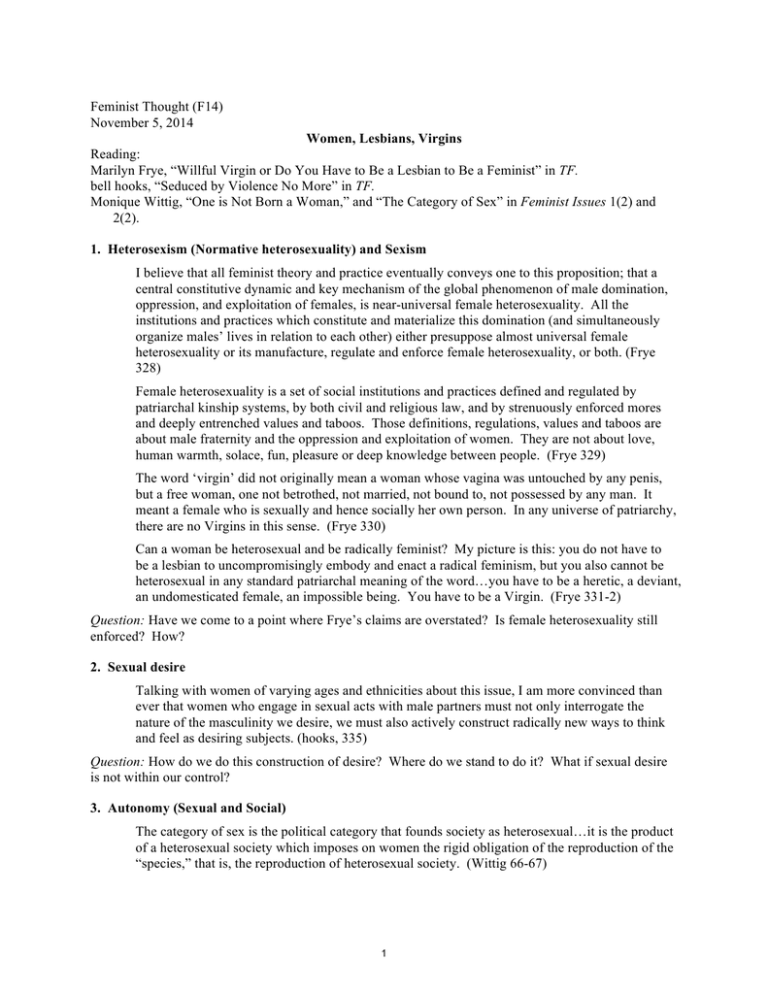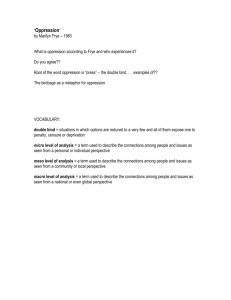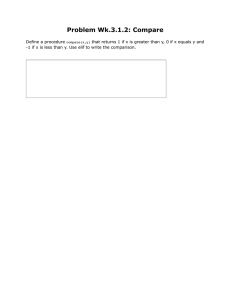
Feminist Thought (F14)
November 5, 2014
Women, Lesbians, Virgins
Reading:
Marilyn Frye, “Willful Virgin or Do You Have to Be a Lesbian to Be a Feminist” in TF.
bell hooks, “Seduced by Violence No More” in TF.
Monique Wittig, “One is Not Born a Woman,” and “The Category of Sex” in Feminist Issues 1(2) and
2(2).
1. Heterosexism (Normative heterosexuality) and Sexism
I believe that all feminist theory and practice eventually conveys one to this proposition; that a
central constitutive dynamic and key mechanism of the global phenomenon of male domination,
oppression, and exploitation of females, is near-universal female heterosexuality. All the
institutions and practices which constitute and materialize this domination (and simultaneously
organize males’ lives in relation to each other) either presuppose almost universal female
heterosexuality or its manufacture, regulate and enforce female heterosexuality, or both. (Frye
328)
Female heterosexuality is a set of social institutions and practices defined and regulated by
patriarchal kinship systems, by both civil and religious law, and by strenuously enforced mores
and deeply entrenched values and taboos. Those definitions, regulations, values and taboos are
about male fraternity and the oppression and exploitation of women. They are not about love,
human warmth, solace, fun, pleasure or deep knowledge between people. (Frye 329)
The word ‘virgin’ did not originally mean a woman whose vagina was untouched by any penis,
but a free woman, one not betrothed, not married, not bound to, not possessed by any man. It
meant a female who is sexually and hence socially her own person. In any universe of patriarchy,
there are no Virgins in this sense. (Frye 330)
Can a woman be heterosexual and be radically feminist? My picture is this: you do not have to
be a lesbian to uncompromisingly embody and enact a radical feminism, but you also cannot be
heterosexual in any standard patriarchal meaning of the word…you have to be a heretic, a deviant,
an undomesticated female, an impossible being. You have to be a Virgin. (Frye 331-2)
Question: Have we come to a point where Frye’s claims are overstated? Is female heterosexuality still
enforced? How?
2. Sexual desire
Talking with women of varying ages and ethnicities about this issue, I am more convinced than
ever that women who engage in sexual acts with male partners must not only interrogate the
nature of the masculinity we desire, we must also actively construct radically new ways to think
and feel as desiring subjects. (hooks, 335)
Question: How do we do this construction of desire? Where do we stand to do it? What if sexual desire
is not within our control?
3. Autonomy (Sexual and Social)
The category of sex is the political category that founds society as heterosexual…it is the product
of a heterosexual society which imposes on women the rigid obligation of the reproduction of the
“species,” that is, the reproduction of heterosexual society. (Wittig 66-67)
1
This is why we must destroy [the category of sex] and start thinking beyond it if we want to start
thinking at all, as we must destroy the sexes as a sociological reality, if we want to start to exist.
(Wittig 68)
In order to be aware of being a class and to become a class we have to first kill the myth of
“woman” including its most seductive aspects…but to become a class we do not have to suppress
our individual selves, and since no individual can be reduced to her/his oppression we are also
confronted with the historical necessity of constituting ourselves as the individual subjects of our
history as well…For once one has acknowledged oppression, one needs to know and experience
the fact that one can constitute oneself as a subject (as opposed to an object of oppression), that
one can become someone in spite of oppression, that one has one’s own identity. There is no
possible fight for someone deprived of an identity, no internal motivation for fighting, since
although I can fight only with others, first I fight for myself. (Wittig 51)
Class consciousness is not enough. We must try to understand philosophically (political) those
concepts of “subject” and “class consciousness” and how they work in relation to our history.
When we discover that women are the objects of oppression and appropriation, at the very
moment we are able to perceive this, we become subjects in the sense of cognitive subjects
through an operation of abstraction. Consciousness of oppression is not only a reaction to (fight
against) oppression. It is also the whole concept reevaluation of the social world, its whole
reorganization with new concepts, from the point of view of oppression…(Wittig 52)
Question: Is Wittig’s view compatible with a liberatory transgender politics?
Wittig, Monique. "The Category of Sex." In The Straight Mind and Other Essays. Beacon Press, 1992.
© Beacon Press. All rights reserved. This content is excluded from our Creative Commons license.
For more information, see http://ocw.mit.edu/help/faq-fair-use/.
Wittig, Monique. "One is Not Born a Woman." In The Straight Mind and Other Essays. Beacon Press,
1992. © Beacon Press. All rights reserved. This content is excluded from our Creative Commons
license. For more information, see http://ocw.mit.edu/help/faq-fair-use/.
Frye, Marilyn. "Willful Virgin or Do You Have To Be a Lesbian To Be a Feminist?" In Theorizing Feminisms:
A Reader. Edited by Elizabeth Hackett and Sally Haslanger. Oxford University Press, 2005. © Oxford
University Press. All rights reserved. This content is excluded from our Creative Commons license.
For more information, see http://ocw.mit.edu/help/faq-fair-use/.
hooks, bell. "Seduced by Violence No More." In Theorizing Feminisms: A Reader. Edited by
Elizabeth Hackett and Sally Haslanger. Oxford University Press, 2005. © Oxford University
Press. All rights reserved. This content is excluded from our Creative Commons license.
For more information, see http://ocw.mit.edu/help/faq-fair-use/.
2
MIT OpenCourseWare
http://ocw.mit.edu
WGS.301J / 17.007J / 24.237J / 17.006 Feminist Thought
Fall 2014
For information about citing these materials or our Terms of Use, visit: http://ocw.mit.edu/terms.





